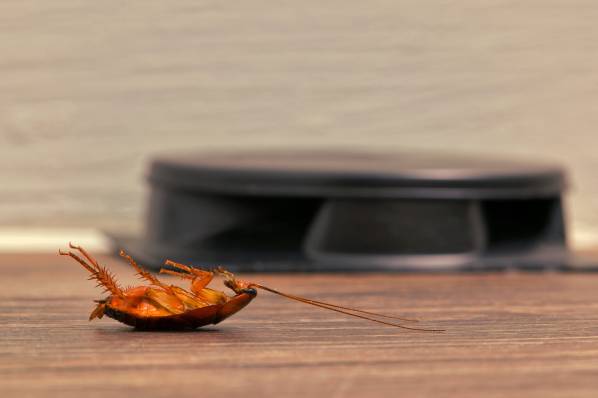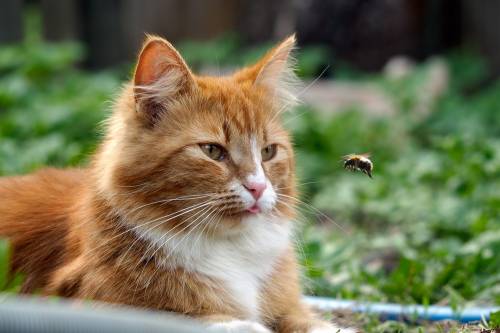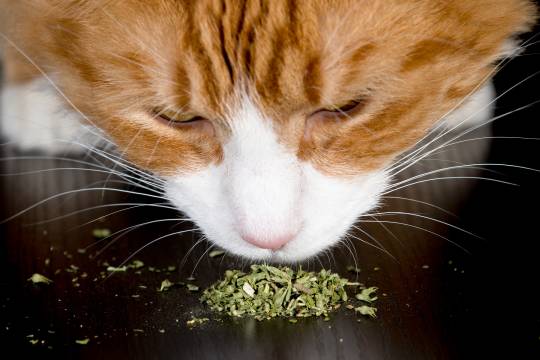Connect with a verified veterinarian in minutes. Licensed vets are available 24/7 to answer your questions. No need to worry about your furry family member.
Roaches are the bane of people everywhere. They can quickly infest a home and cause a wide range of problems. When there’s a roach problem, many pet parents reach for OTC roach pesticides to get rid of the bugs. That means cats may have an opportunity to find and eat something like Combat Roach Bait. But what happens if a cat eats roach bait?
Has your cat eaten Combat Roach Bait? Are you worried the Combat Roach Bait will make your cat sick? If so, you’ve come to the right place. We understand it can be scary when your cat eats something like this.
We’ve gathered information about Combat Roach Bait and whether it can make a cat sick. Let’s get started!
What is Combat Roach Bait?
Combat Roach Bait is an insecticide that works to kill cock roaches. This roach pesticide uses a chemical called hydramethylnon. This ingredient is toxic to roaches and other pests; however, it has low toxicity for pets.
Hydramethylon works by inhibiting certain enzymes that aid metabolism. In other words, this chemical disrupts the energy production of the pest’s cells. This is a slow-acting poison that must be eaten in order to be effective.
This pesticide comes in different forms, including bait traps and a roach-killing gel.
While Combat Roach Bait is safe when used as directed, what happens if a cat eats this insecticide?
Combat Roach Bait & Cats
The good news is that Combat Roach Bait is only slightly toxic to cats. A cat would need to eat a lot of this pesticide to have a deadly reaction. However, a cat can still get sick from eating Combat Roach Bait.
It’s possible the cat could end up with some digestive system problems, such as vomiting, nausea, and diarrhea. These symptoms should not last longer than 12 to 24 hours or be accompanied by other symptoms.
And it’s also possible that a cat may be tempted to eat the bait trap, which is made of plastic. The problem here is that the plastic, after being chewed, could break up into sharp bits. These small bits could cause punctures or tears in the cat’s throat or anywhere in the digestive tract.
If a cat ate the entire bait trap, all the plastic could form an obstruction in the cat’s digestive system.

Review symptoms, medications & behavior to keep your pets healthy with a Vet Online in just minutes.
Ask a Vet Live NowSymptoms of Combat Roach Bait Ingestion in Cats
You may notice these symptoms if your cat eats Combat Roach Bait:
Bait Symptoms:
- Vomiting
- Diarrhea
- Muscle tremors
- Convulsions
- Lethargy
If you notice these symptoms in your cat, call the vet immediately. This is an emergency.
Plastic Trap Symptoms:
- Vomiting
- Diarrhea (could be bloody)
- Constipation
- Lethargy
- Loss of appetite
- Abdominal pain & swelling
- Aggression (from pain and feeling sick)
If you notice these or other symptoms in your cat, call the vet immediately. This is an emergency.
Treatment
Treatment for your cat depends on her symptoms and whether she’s eaten only the bait or has also eaten the trap.
The prognosis is best for cats who receive prompt medical treatment after ingesting Combat Roach Bait or its plastic trap. In the future, it’s best to keep this and all other pesticides out of your cat’s reach. You’ll both be happier for it!
Connect with a verified veterinarian in minutes. Licensed vets are available 24/7 to answer your questions. No need to worry about your furry family member.

Julie
Julie is a graduate of the University of North Carolina, Wilmington, where she studied Animal science. Though contrary to the opinion of her parents she was meant to study pharmacy, but she was in love with animals especially cats. Julie currently works in an animal research institute (NGO) in California and loves spending quality time with her little cat. She has the passion for making research about animals, how they survive, their way of life among others and publishes it. Julie is also happily married with two kids.
Review symptoms, medications & behavior to keep your pets healthy with a Vet Online in just minutes.
Ask a Vet Live Now




